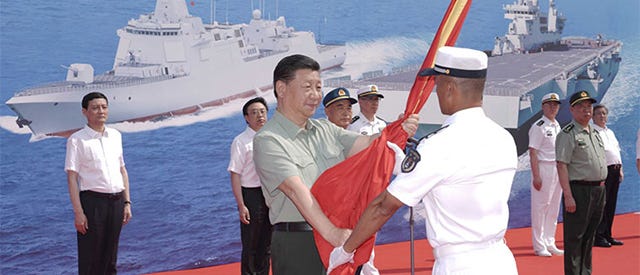20th & 21st Century Lessons with Chinese Characteristics: Toshi Yoshihara, on Midrats
a serious nation with serious plans
For the last 23 years, the major powers outside the People’s Republic of China (PRC) have been engaged in a series of imperial police actions like in Afghanistan, small wars turning into inextricable problems, like Iraq, and not-insignificant medium sized wars as we see in Ukraine.
The PRC chose to stay out of these conflicts, but has been learning from them.
After studying 20th-century Pacific war lessons deeply and, though untested in combat since 1979, the PRC is preparing for something.
Dr. Toshi Yoshihara returned to Midrats to discuss what the PRC has studied most and how its study is manifesting in policy and action.
You can listen from this link, or the Spotify widget below.
Remember, is you don’t already, subscribe to the podcast.
Toshi is a Senior Fellow at the Center for Strategic and Budgetary Assessments. He was previously the inaugural John A. van Beuren Chair of Asia-Pacific Studies and a Professor of Strategy at the U.S. Naval War College.
Dr. Yoshihara’s latest book is Mao’s Army Goes to Sea: The Island Campaigns and the Founding of China’s Navy (Georgetown University Press, 2022). A Japanese translation of Mao’s Army Goes to Sea was published in 2023. He co-authored, with James R. Holmes, the second edition of Red Star over the Pacific: China's Rise and the Challenge to U.S. Maritime Strategy (Naval Institute Press, 2018). The book has been listed on the Chief of Naval Operations Professional Reading Program, the Indo-Pacific Command Professional Development Reading List, and the Commandant of the Marine Corps Professional Reading Program.
Dr. Yoshihara is the recipient of the 8th annual Kokkiken Japan Study Award by the Japan Institute for National Fundamentals in July 2021 for his CSBA study, "Dragon Against the Sun." In 2016 he was awarded the Navy Meritorious Civilian Service Award in recognition of his scholarship on maritime and strategic affairs at the Naval War College.
Dr. Yoshihara served as a visiting professor at the Fletcher School of Law and Diplomacy, Tufts University; the School of Global Policy and Strategy, University of California, San Diego; and the Strategy Department of the U.S. Air War College. He currently teaches a graduate course on seapower in the Indo-Pacific at the School of Foreign Service, Georgetown University.
Showlinks
Chinese Lessons from the Great Pacific War: Implications for PRC Warfighting, CBSA
China is Learning About Western Decision Making from the Ukraine War, by Mick Ryan
U.S. Navy's Top Officer Plans for Confrontation With China by 2027
Summary
In this conversation, Toshi Yoshihara, Sal, and Mark delve into the lessons that the People's Liberation Army (PLA) has learned from historical conflicts, particularly the Pacific War in World War II. They discuss the importance of logistics, intelligence, and joint operations in modern warfare, as well as how the PLA is analyzing past battles to inform its future strategies. The conversation also touches on the implications of the ongoing Russia-Ukraine conflict and the concept of comprehensive national power in the context of military readiness and capability.
Takeaways
The PLA has not fought a major war since 1979, relying on historical analysis.
China studies past conflicts to inform its military strategies.
Logistics played a crucial role in the success of the US in the Pacific War.
Shore-based air power is essential for modern military operations.
The PLA recognizes its weaknesses in joint operations and is working to improve.
Intelligence gathering and analysis are vital for understanding adversaries.
The study of history is integral to military education in China.
The PLA draws lessons from both World War II and contemporary conflicts.
China is observing the Russia-Ukraine war for strategic insights.
Comprehensive national power is a key concept in assessing military capabilities.
Chapters
00:00: Introduction and Context of the Discussion
02:56: China's Learning from Historical Conflicts
09:12: Analyzing Key Battles of the Pacific War
20:44: Logistics and Its Importance in Warfare
27:53: The Concept of Joint Operations in Military Strategy
30:06: The Role of Intelligence in Modern Warfare
34:05: Intellectual Approaches to Military History
43:17: Lessons from the Japanese and American Military Strategies
48:56: Learning from the Russia-Ukraine Conflict
58:01: Comprehensive National Power and Its Implications



China wants the Pacific right up to the west Coast of the USA.
I'll defer to long term shipbuilding industry insiders, as my shipyard time was quite brief. Clearly, allies with existing robust shipbuilding capability can get things done faster than we can rebuild / create from scratch our yards. Does having a foreign company purchase capacity in the U.S. even make sense? With all the restrictions, environmental requirements, lack of skilled (and willing) workers, "other" labor related issues, is this more a matter of playing a long game (decade or more down the road) with foreign build the immediate fix?